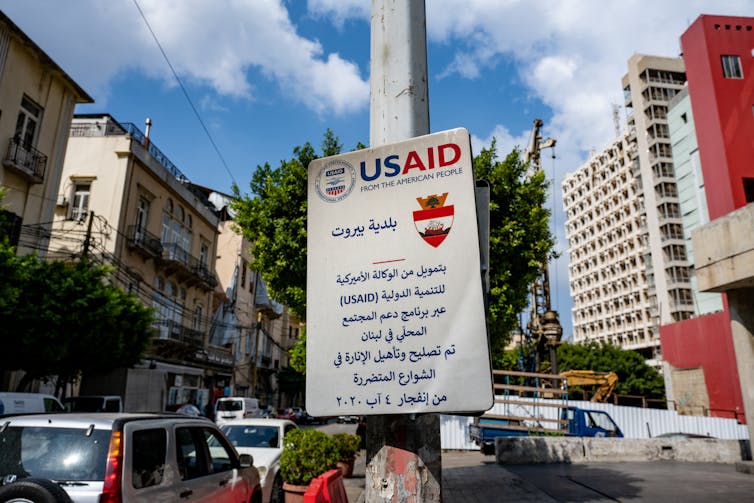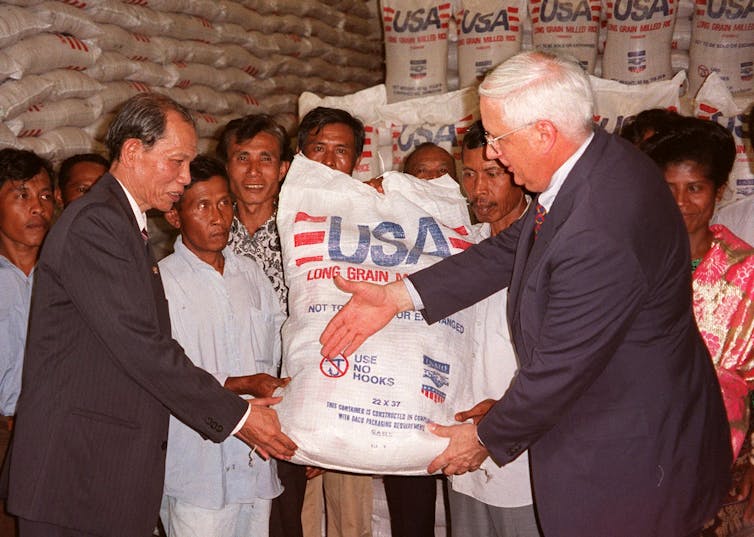
By Christian Ruth
The Trump administration’s sudden dismantling of nearly all foreign aid, including the work carried out by the U.S. Agency for International Development, has upended the government agency’s longtime strategic role in implementing American foreign policy.
The Trump administration said at the end of February 2025 that it is freezing 90% of USAID’s foreign aid contracts, leaving few projects intact. It has also recalled nearly 10,000 USAID staff from countries around the world.
USAID is a government agency that, for more than 63 years, has led the United States’ foreign aid work on disaster recovery, poverty reduction and democratic reforms in many developing and middle-income countries.
Reuters reported that a senior USAID official wrote in a March 2 internal memo that a yearlong pause in USAID’s work on health, food and agriculture in the world’s poorest countries would raise malaria deaths by between 71,000 and 166,000 annually, an increase of nearly 40%. It would also result in an increase of between 28% and 32% in tuberculosis cases, among other negative effects.
As a historian of USAID, I know well that the agency has long faced a surprisingly high degree of scrutiny for its relatively tiny portion of the national budget.
USAID’s budget has always been small – recently, in 2023, making up a roughly US$50 billion drop in the $6 trillion ocean of the federal budget. But USAID’s projects have had an outsized effect on the world.
From a foreign policy standpoint, USAID’s greatest contribution to American influence abroad has always been its intangible soft-power effects. It helps to create an image of the U.S. as a positive, helpful world power worth partnering with.

Scott Peterson/Getty Images
Responding to a Soviet threat in the 1960s
USAID dates back to 1961, born from Cold War confrontations between the U.S. and the Soviet Union.
In 1961, President John F. Kennedy merged several separate foreign aid agencies and offices – including the Mutual Security Agency, the Point Four Program and the Foreign Operations Administration – into one new agency.
Kennedy, like other American presidents in the early years of the Cold War, fretted over the spread of communism.
A well-known development economist, Walt Rostow, who served in Kennedy’s administration, was among the experts who argued that the Soviet Union could easily influence poor countries in Latin America, Africa and Asia. It was possible, Rostow argued, to help these countries grow their economies and become more modern.
This possibility pushed Kennedy in 1961 to sign the Foreign Assistance Act, creating USAID that November.
USAID immediately began to oversee U.S. foreign aid programs to develop farming, irrigation and dam construction projects throughout Southeast Asia, Africa and Latin America, taking over the existing projects of the various other aid departments that were now defunct.
USAID was also responsible for public works projects in Cold War conflict zones, particularly Vietnam. There, USAID struggled in its efforts to build dams, improve rural agriculture techniques and construct South Vietnamese infrastructure. There were various environmental challenges working in the dense jungles, the physical threats caused by the ongoing Vietnam War and the realities of rural poverty.
For example, USAID introduced new farming technologies to Vietnam, including modern fertilizers and tractors. This helped some farmers produce more crops, faster. But it also created disparities between wealthy and poor farmers, as modern fertilizer and other improvements were expensive. A growing number of poor farmers simply gave up and moved to nearby cities.
Throughout the 1960s, USAID also funded the construction of hydropower water dams in Asia and Africa. This led to higher energy production in those regions, but also resulted in environmental degradation, as recklessly dammed rivers flooded forests and arable fields.
Rostow and other development experts had unrealistically high goals for helping poor countries grow their economies. By the end of the decade, across the board, USAID beneficiary countries in Asia and Africa fell short of the economic growth expectations the U.S. set at the beginning of the 1960s.
Still, USAID made substantial progress in developing food production and some economic growth, and improving the health of people in rural parts of countries such as India and Ghana.
But that progress had limits and did not magically turn these economies into modern, Western-style capitalist democracies.

Paul Conklin/Getty Images
Mixed results and focus
As a result of USAID’s uneven progress in modernizing poor countries, the agency’s approach shifted in the 1970s and ‘80s.
In the early 1970s, Congress and development experts pushed USAID away from grand, gross domestic product-focused modernization projects like dams, which they ostracized for their high costs and lack of tangible results.
Instead, with the support of the Carter administration, USAID began to work more on meeting poor people’s basic human needs, including food, shelter and education, so they could lift themselves out of poverty.
The agency shifted priorities once again in 1981, after President Ronald Reagan took office. His administration created programs meant to advertise American businesses and draw developing countries into the global marketplace.
Rather than USAID giving money to a local government to build a well in a rural village, for example, the agency increasingly started contracting local or American businesses to do so. The U.S., in other words, began outsourcing its foreign aid.

Bernard Estrade/AFP via Getty Images
USAID’s next phase
At the end of the Cold War in 1991, the United States’ interest in spending money on helping poorer countries develop and modernize declined around the world.
USAID shifted priorities once again.
Without the threat of the Soviet Union, USAID’s mission throughout the 1990s became increasingly focused on new issues. These included democracy promotion in former Soviet countries in Eastern Europe. Sustainable development – a broad term that means promoting economic growth while respecting environmental concerns and long-term natural resource usage – was another focus in different regions.
After the U.S. invaded Iraq and Afghanistan in the early 2000s, USAID struggled to fulfill its existing international projects while also rebuilding critical infrastructure to resurrect the Iraqi and Afghani economies during wartime.
USAID’s funding remained stagnant in the 2010s after the recession. At the time, its annual budget was roughly $25 billion.
At the same time, China expanded its own international development program to entice governments toward its side and to tether them to the Chinese economy.
China’s aid work in South America has expanded rapidly over the past several years, and it is now the region’s top trading partner and also a major contributor to investment, energy and infrastructure projects. China’s aid and investment work in Africa has also grown considerably over the past few decades.
Now, with USAID’s dissolution, Chinese influence throughout poor and middle-income countries is expected to grow.
A lasting mark
Despite its limitations and frustrations, in my view, USAID has had an undeniable, and often massive, positive impact on the world.
USAID’s efforts to promote American businesses and exports abroad have resulted in the creation of thousands of jobs, both domestically and abroad, in a wide variety of industries, ranging from farming to medical sciences.
The tens of thousands of water wells and other forms of critical rural infrastructure the agency has funded, or created itself, have provided clean, safe drinking water for millions in Africa. The agency’s Office of Foreign Disaster Assistance has provided decades of critical disaster assistance during famines, earthquakes and hurricanes around the world.
These humanitarian efforts cost money, however. Some Republicans, including politicians and voters, say they have found the idea of American tax dollars being sent abroad, whether during the Cold War or today, wasteful, and others have worried over how aid funds may have been abused.
USAID has always straddled a difficult line, as development is a messy field. But ending U.S. foreign aid will be much messier, and it could also cost millions of people who are reliant on USAID their health or lives.
![]()
Christian Ruth is an America in the World Consortium Postdoctoral Fellow at the University of Florida.





























Atwp says
Sound like a good program. Born in 1961 to help other countries. Where was the help for African Americans then and now. My people lived in poverty because of the government’s anti African American bills. This doesn’t anything to do with unsaid, but this country liberated Europe in the 40,s hung Black People at the same time. Help other countries but kill US citizens on US soil. Am sure most of the citizens were African American men. I don’t like Trump but I agree with him about cutting or ending this program.
Jake from state farm says
The article provides a strong case for the positive impact the agency has made, but it overlooks a critical aspect: there is no acknowledgment of how the agency has evolved over time. There is no mention of the billions in wasteful spending that has continued unchecked.
I also find it interesting when statements like this are made: “USAID’s budget has always been small – recently, in 2023, making up a roughly US$50 billion drop in the $6 trillion ocean of the federal budget. But USAID’s projects have had an outsized effect on the world.” While that might be true, I can’t help but wonder what could have been done with even a fraction of that $50 billion to support our veterans who are living on the streets or to help people devastated by natural disasters. Our Congress dispenses these funds without meaningful oversight. Why isn’t there any real outrage about the waste? Where are the investigative journalists digging into how this money is being spent?
Ray W, says
The Associated Press reports that Israel’s energy minister sent a letter to the Israel Electric Corporation, by which the corporation was ordered to stop selling power to Gaza. A week ago, Israel stopped permitting entry of trucks carrying goods into Gaza.
Gaza’s primary source of water is its desalination plant, which runs on electricity. Whether Gaza has sufficient diesel fuel to run generators is not addressed in the article.
According to the author, Hamas has been pressing to restart negotiations on the second phase of the ceasefire.
Make of this what you will.
Jackson says
It’s about time they stood up for the rule of law. Congress appropriated that money already. It’s not an option to pay it. It’s the law.
USAID purchases 41 per cent of their food in the amount of 2 billion annually from American farmers. There may not be a private sector entity to sell their crops to.
Jim says
It’s easy to attack sending taxpayer dollars out of the country when we have serious needs here that are not being met. I don’t think anyone can quarrel with that.
However, the elimination of this function of the US government is going to have very serious negative effects on this country in the coming years. By providing food and health care to folks that need it, the US generates good will amongst citizens of foreign countries. We have helped many people survive and improve their quality of life through this program. Why do you think most people try to enter the USA any way they can? They are trying to improve their life. When we help them out in their own country, we help provide incentive to them to stay there because we’ve provided them hope and opportunity. And with hope and opportunity, many people also become more appreciative of democracy, freedom and capitalism. Isn’t that what we want to world to do?
Does all the money spent by USAID get spent wisely and efficiently? No. No program within the US government can claim that (at least in my 40 years working with the government). But the money saved is not going to go to any program helping US citizens. Just look around you. DOGE is cutting into everything that many of us depend on. If you’re a veteran, I don’t think you’re going to see better care at the VA after all the cuts are made. I think not only will it get worse, some vets will end up dying that didn’t need to. It’s sure not going to any minorities like ATWP wants. If anything, most minorities in this country are just hoping to stay out of MAGA’s crosshairs. Any minority expecting a bigger slice of the pie in this administration just hasn’t been paying attention. And if you depend on Medicaid, well, we need to find $880B to fund the Republican tax cut. No program helping Americans is going to see one more dime than it’s been getting.
And now they are digging into the Social Security administration. Look out Florida! Those checks many of us expect every month (and worked our whole life to earn) may be soon at risk. The whole social security system is based on a computer system running COBOL! That system was running when I was in college. It’s probably in worse shape than I am! And if/when they dump the IT guys nursing that day by day and it crashes, how long do you think it’s going to take to reprogram and get a “new” system up and running? And what’s the chance that the government will make sure you get “made whole” by getting any and all missed payments in the interim?
In my working career, seldom did I encounter any program, production operation or support team that couldn’t be criticized for mistakes, weaknesses and at least occasional failures. Private industry is far from perfect as well. “World Class Manufacturing” has a goal of being up and running 80% of the time! That means to be the best in the world, if you could just avoid shutting down one day out of 5, you were considered the best by World standards! Yet many of those I did work with were extremely successful and accomplished the mission assigned. I think USAID probably fits that description. It’s not perfect but it did do a lot of good work and our country is going to see the negative results of shutting the whole thing down. I’m sure China is giddy with glee at our folly.